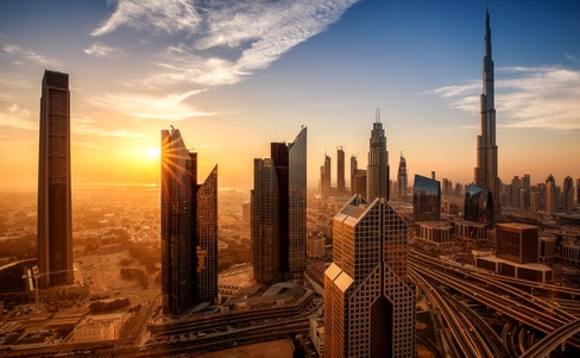The country is preparing to enter into the post-oil era by diversifying into a knowledge and sustainable innovation-driven economy
For the first time in modern history, humans are looking for safety in separation. The pandemic has left us relying on social distancing and masks to shield ourselves from an invisible threat that may be lurking in any space and on any surface. And unlike ever before, the online world has become our safe-haven, keeping us away from the dangers of the physical world.
The most important lesson we’ve learnt amid the stark challenges of the past year is that our need to communicate with each other is essential to our survival and well-being.
For humanity to prosper, we must embrace the fact that our new reality requires communication with and through, everything around us: with each other, with our devices and even between devices. And while the pandemic might have laid waste to the old ways of living and working to which we had grown accustomed to, our determination to cope with it and evolve despite it, has created a significant new opportunity.
At no other point in history has humanity had to step into the future. We have made tremendous progress in an unprecedented period of time and we now stand at the verge of a full-fledged industrial revolution that is reshaping our global economy.
Could it be that society’s hope resides in machines that transmit our thoughts, emotions and concerns across cables and networks to colleagues and loved-ones near and far? The growing population of people across the world that are working remotely would suggest so. And this will certainly be further cemented as our children, the future leaders of our world, continue to have their personalities shaped virtually through distance learning and digital interactions.
READ MORE
Across each of the three prior industrial revolutions (steam, electricity and electronics), the direct impact has been a mass optimisation of production. However, the fourth industrial revolution (4IR) is relying on an array of new technologies, including artificial intelligence, internet of things (IoT), cloud computing, blockchain and 5G to completely transform the way industries, governments and societies function. From transport to finance, food, energy, healthcare and education, 4IR technologies will integrate communication through digitisation to enhance production and influence every aspect of our lives.
So, where does our journey to the future start? In light of the global pandemic, it is essential to understand the trends that will govern our world over the next decade. And for that, we must be inspired by countries that have successfully managed the crisis, overcome immense challenges and identified opportunities for growth and success. For us in the UAE, the answer is very simple: the future starts here.
The UAE has demonstrated an unparalleled level of crisis management to emerge as a regional and global force. It remains one of the leading countries on Covid-19 testing and is within the top five worldwide in the percentage of citizens and residents vaccinated, surpassing any of the G20 countries.
While preserving the health of its workforce, it has continued to remain economically vibrant. So much so that at a time when the vast majority of the world was engulfed in attempting to manage the crisis, the UAE became the first Arab country to launch a probe to Mars.
The UAE’s unique ability to navigate through an unprecedented situation is the result of a vision 50 years in the making. Since its establishment in 1971, the country has sought to build an advanced technological and industrial sector. Today, the industrial sector contributes to about eight per cent of the country’s gross domestic product, serving as a model for developing countries looking to advance their industrial sector. And it didn’t stop there.
Over the next 50 years, the country is preparing to advance into the post-oil era by diversifying into a knowledge and sustainable innovation-driven economy, developing an industrial sector underpinned by 4IR technologies.
With the launch of a UAE Strategy for the Fourth Industrial Revolution and the establishment of a Ministry for Artificial Intelligence, the Emirates has strengthened its position as one of the most prominent global destinations that can attract foreign direct investment in the advanced technologies sector.
In addition, the young country has made remarkable progress in advancing a number of specialised industries such as aviation, military, mining, renewable energy, and the information and communication technology sector.
For the many reasons above, the fourth edition of the Global Manufacturing and Industrialisation Summit (#GMIS2021) will be held alongside Expo Dubai under the theme of ‘Rewiring Societies: Repurposing Digitalisation for Prosperity’.
From its ambitious inauguration four years ago, the Global Manufacturing and Industrialisation Summit has served as a voice and venue for heads of state, ministers, chief executives, technologists, academics and industry leaders to share their knowledge with the rest of the world.
By promoting the use of technology as a tool for global co-operation, the summit has become an international gathering place for greater investment in capabilities, innovation and global skills development.
#GMIS2021 will reinforce the vision for a future that is reliant on digitalisation and connectivity, a future where our world cannot prosper without humans and machines coexisting in harmony. In line with Expo Dubai’s theme of “Connecting Minds, Creating the Future”, #GMIS2021 will inspire conversations that will shape a digitally inclusive, interconnected and sustainable future for all.
Badr Al-Olama is the head of the organising committee of the Global Manufacturing and Industrialisation Summit.
https://amp-thenationalnews-com.cdn.ampproject.org/c/s/amp.thenationalnews.com/business/the-uae-is-preparing-for-the-future-by-investing-in-advanced-technology-1.1226248






